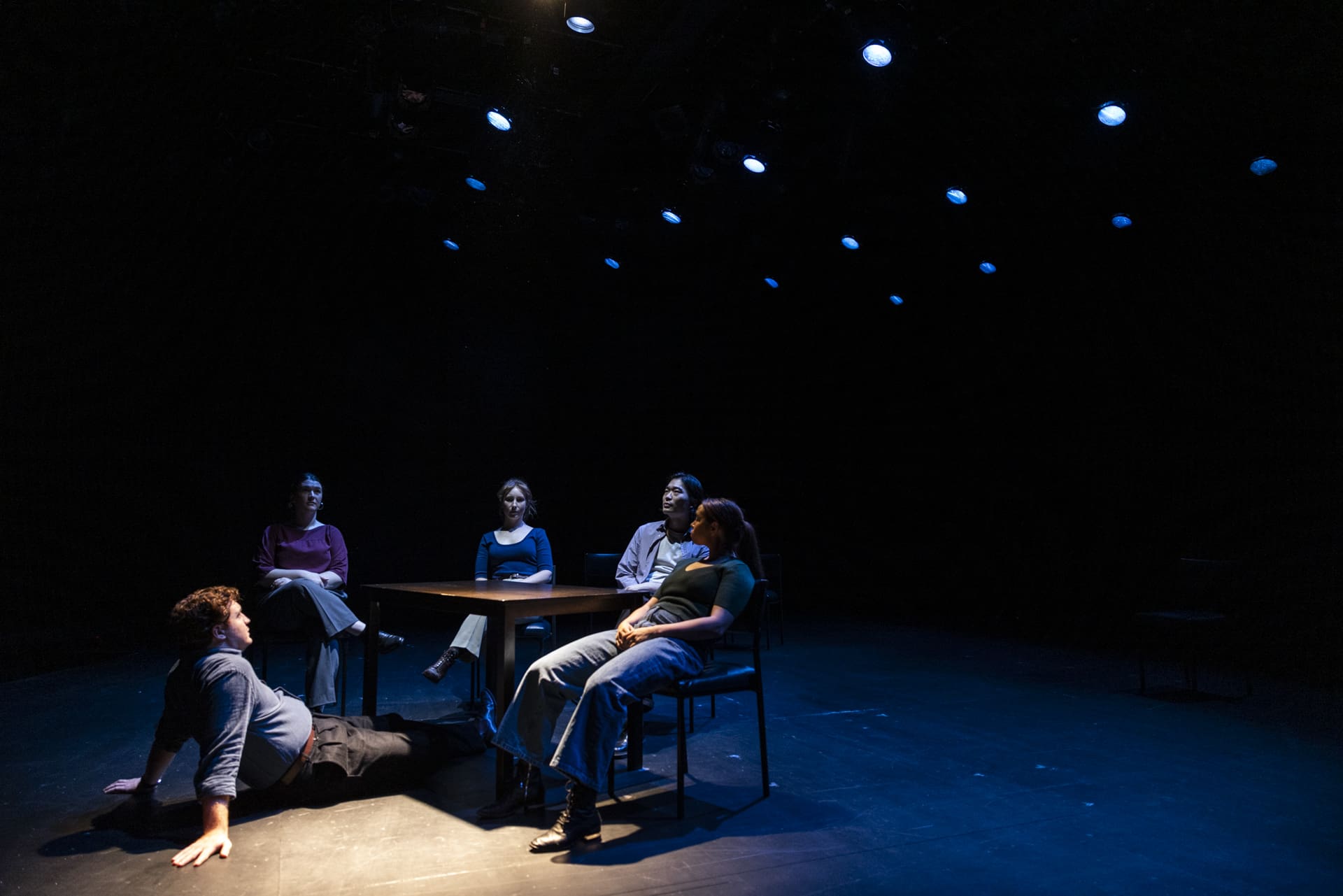The play begins with a conversation. Two people, sitting at a table, discussing whether plastic bags are truly worse for the environment than paper bags, leading very quickly into the question of “should we have a child in an age of climate ruin.” It’s a playful start; as funny and relevant, as it is affective and sobering. From here, we continue.
Structured as a series of fifty, thematically linked but mostly self-contained, vignettes, David Finnigan’s Scenes from the Climate Era is as much an exploration of the ways in which we engage with, and respond to, a world that has been irreversibly environmentally damaged by human actions, as it is yet another reckoning that our actions and choices — big or small, taken or not-taken — have consequences. Non-linear, naturalistic, and dialogue driven, the play is inspired by the many conversations Finnigan has heard, or absorbed, or taken part in, over the last five years “in meeting rooms, on social media, over dinner tables, in bus shelters, car radios and on dancefloors.” It is, itself, an exposition on the four stages of coming to terms with climate change – denial, solutions, despair, hope – which is identified early on in the play and called back to throughout.
The son of a climate scientist, a long-standing supporter and collaborator of climate experts, Finnigan is no stranger to these climate conversations (see Kill Climate Deniers). But, as he writes in his program note, these last five years have been different. Conversations, political or otherwise, have shifted in mindsets, goals, ambitions, and rhetoric. We were all born onto a planet, Finnigan posits, that was “already gone”, we just didn’t know it. Now, we are long past the point of no return. All we can do is try to come to terms with the world we do live in, and rethink how to live in it.
This is easy to see reflected in the play. The production is a piece of epic theatre in both (Brechtian) technique and scope. The fourth wall is broken; times, places, and montages are announced; the largeness of the climate problem is juxtaposed against the sparseness of the set, furnished with only a table and eight chairs; stories are told directly to the audience, not to show they are fiction, but to shake us into realising our past actions, their present repercussions, and what may lie ahead.
The ensemble cast (Harriet Gordon-Anderson, Abbie-Lee Lewis, Brandon McClelland, Ariadne Sgourgos and Charles Wu) shift through the swathe of characters, places, and decades seamlessly and purposefully. From grandfathers who call wind turbines “bird-slicers”, to scientists being trained by media personnel on making sure bad news is made palatable to audiences through hopeful suggestions, to pilots dancing in nightclubs in Beijing after a long day of dispersing sulphuric acid into the atmosphere in order to cool it, these characters come across as regular people who, like the rest of us, talk through climate conversations without having all the answers. These characters are not afraid to ask the hard questions or lead us through difficult moments; whether that be debating the ethics of eradicating an entire introduced mice species — or, to simply put it, committing genocide — if it means it prevents the extinction of others, or keeping vigil over a single frog (affectionately named Smiley), the last of its kind — an “endling” — calling out for a mate that no longer exists. In the face of imminent climate disaster, these characters cause us to reckon with what the future ‘everyday’ will look like, and what impossible choices we will inevitably have to make.
Of course, with the play exploring and commenting on what it does, there comes the contention with the banality, and sheer vastness, that surrounds conversations concerning the climate crisis. Thankfully, Scenes from the Climate Era does not fall back on didacticism and recycled cliches. With Carissa Licciardello’s careful and capable direction, combined with Nick Schlieper’s minimal set and lighting (and purposeful changes of both), and Ella Butler’s understated costuming, the production comes across as something real and raw; impacting and inevitable. Over the course of 80 minutes, and the build-up of these fifty scenes, I laughed — sometimes intentionally, sometimes in confusion — and was brought to the brink of tears near constantly (but especially upon the final transformation of the set which I won’t spoil here, because it needs to be seen to be truly felt).
And as a child of the “School Strikes 4 Climate” generation, another particular scene hit harder than most. It’s around the halfway mark. We see a group of friends, sitting around a table, having a late-night conversation of the existential kind, talking, of course, to the inescapable climate crisis. One friend quips that it’s not a crisis. Above the ruckus of disagreement, they continue that it’s too big to be a crisis. If it’s just a crisis, then everyone alive today was born in the crisis, continues to live in the crisis, and will die in the crisis too. So, then, it’s not a crisis; it’s an era. It’s a hard thought to swallow.
The conversation continues, cycling through questions surrounding historical eras, until someone asks the question we were all thinking — then when will this era end? Will it ever end? And how will we truly, truly know?
We’ll know, the play suggests, through a sound.
In the not-so-far-off future, sea levels will continue rising and take with it coasts, coastlines, and whole island nations. Our beaches will disappear beneath the water. And one day, in the distant-far-off future, the sea will recede, and they’ll return. And with it, the sound of waves crashing on the beach.
This sound is what will mark the end of the climate era. This sound is how we will know that we’ve made it through.
Scenes from the Climate Era will be playing at Belvoir St Theatre until June 25. Tickets are available here.





